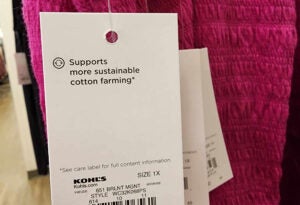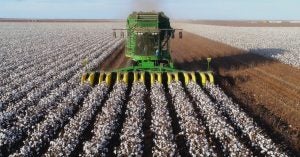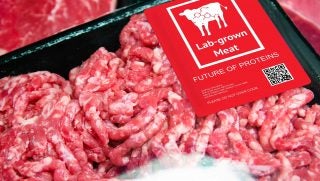While engaging in one of America’s favorite pastimes — shopping, of course — recently, I came across an interesting sales tag on an item of clothing from Kohl’s: “Supports more sustainable cotton farming.”
I looked it up when I got home, and it turns out it really has very little to do with cotton farms. But I know that so-called “sustainable” cotton is trendy. I’ve noticed some brands now source only organic threads, and others make claims about eco-friendly production methods.

But does this kind of label actually do any good?
Here’s the thing: Cotton farmers have been implementing sustainable practices for decades now. As with other sectors of agriculture, the cotton industry has embraced science, technology, and innovation — and that’s had incredible results.
Over 20 years ago, cotton growers embraced genetically modified varieties of cotton. Stop me if you’ve heard this one before … But seriously, cotton’s incredible story of sustainability starts here. Scientists used advanced breeding techniques to develop crops that can combat pest pressures while reducing pesticide use. Just as with GMO corn, Bt cotton incorporates a gene that makes it naturally resistant to certain insects.
At the same time, the cotton industry has widely adopted integrated pest management techniques. As Cotton Incorporated describes it, “Growers carefully select the right pesticide for the right pests on the right crop, apply them only when and where necessary, and in the appropriate rates as suggested by the pesticide label.”
Practically speaking, these practices include crop rotation, natural predators, and careful monitoring. Ultimately, the decision to use pesticides weighs the potential pest damage, the pesticide’s efficacy, and the potential for pesticide resistance.

Together these practices were part of a larger trend in U.S. agriculture, which saw a decrease of insecticide use by 66 percent between 1994 and 2019. Over the same time, cotton yields have increased. There’s no question these changes are worthy of praise.
But pesticide use isn’t the only place where cotton growers have improved their production practices. Farmers have embraced innovative irrigation techniques to minimize water usage and increase efficiency. Drip irrigation systems and precision farming deliver water directly to the plants’ root zones and reduce wastage. Moreover, farmers employ sophisticated monitoring systems to accurately determine crop water requirements.
The results of these efforts are astounding. U.S. cotton growers have reduced water use by 79 percent of the past 35 years. Remember, that’s happened at the same time that per-acre yields have increased. (Water conservation, by the way, is something Kohl’s has as a goal on its sustainability page, so this should be just the kind of production approach the company would want to gravitate toward.)

As with other sectors of agriculture, farmers know that healthy soils are the foundation of environmentally friendly production. Cotton producers have adopted conservation tillage and cover cropping methods to promote soil health and minimize erosion. Conservation tillage involves reducing soil disturbance during planting, preserving its structure and organic matter content. Additionally, cover cropping entails planting crops between cotton growing seasons to prevent soil erosion, enhance nutrient cycling, and suppress weeds.
And if all that wasn’t enough, many growers engage in various initiatives and certification programs. One example is the Cotton Trust Protocol, a data-driven program that helps cotton farmers measure and verify their sustainability practices. The program provides a framework for farmers to demonstrate their commitment to sustainable farming through metrics such as water use, greenhouse gas emissions, and soil health.
By implementing sustainable farming practices, reducing pesticide usage, conserving water, and promoting soil health, the cotton industry produces cotton in an environmentally responsible manner. In other words, modern cotton production is highly sustainable. We don’t need to seek a fancy label to feel good about the cotton products we buy.
Amanda Zaluckyj blogs under the name The Farmer’s Daughter USA. Her goal is to promote farmers and tackle the misinformation swirling around the U.S. food industry.



